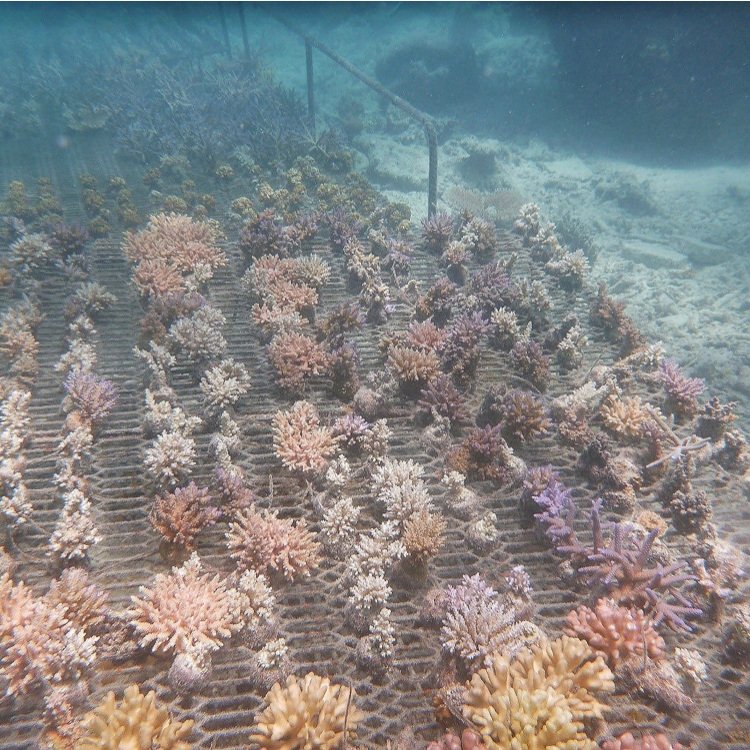Coral reef restoration aided by aquaculture in Fiji
In association with ADE
Problem
Coral reefs worldwide are rapidly degrading, primarily due to anthropogenic induced climate change, threatening ecosystem services for people who rely on coral reefs for food, protection from extreme weather and increasingly ecotourism. This is particularly true of small islander countries such as Fiji, where tourism is a major industry reliant on healthy coral reefs.
Goldsaddle Goatfish (Parupeneus cyclostomus)
Acropora coral (Acropora sp.)
Calsonhoffi’s Nudibranch (Phyllidia carlsonhoffi)
Solution
As governments and other stakeholders strive to address this problem, one approach gaining ground is the restoration of coral reefs using pre-prepared coral fragments. Very little information exists on the survival of coral fragments in the wild and the subsequent ecological benefits of this approach. This study will determine the success of coral fragments placed into the reef substrate to restore coral reef ecosystems in Fiji. It aims to determine the survivorship of corals transplanted over a two-year period and the effect that these transplanted coral fragments has on biodiversity. We will also assess the cost and time effectiveness of transplanting coral fragments immediately onto the reef compared with coral fragments that have been reared for an extended period of time in specially designed racks (Figure 1).
Figure 1. Corals growing on ocean racks.
Approach
Pre-existing coral aquaculture expertise developed by Walt Smith International (WSI) will be used to develop this method of coral reef restoration. These consist of open water aquaculture farms that create and rear coral fragments for sale to the Aquarium trade. Instead, these corals will be transplanted into reef plots and compared to reference plots that recover naturally. Our experiment will be using a Multiple Before After Control Impact design (MBACI), where we measure baseline biophysical factors in these plots prior to transplanting and afterwards. These will be measured using underwater video, visual census and photogrammetry before transplanting takes place, as well as six and 18 months after transplanting has taken place. This will allow us to measure how the coral reef ecosystem recovers with and without the help of additional coral fragment transplanting.
Figure 2. Fish sheltering among the branching Acropora coral.
To ensure the experiment is protected against catastrophic impacts, equal numbers of plots have been established at multiple locations - Fiji North and West districts. Transplant sites were installed proximal to pre-existing coral farm sites to increase efficiency of transplantation and ease of site rediscovery. Six sites were selected in each district, three to be transplanted with fragments and three to be natural reference sites. Three 25m² plots in each site were installed with 200 corals transplanted into each during March 2019 (Figure 2). Baseline biophysical measures were taken in October 2018, with upcoming sampling in mid 2019 and March 2020. Biophysical measures include fish and invertebrate assemblage composition, benthic composition and coral density. Coral recruitment will be determined for all sites using a single tile placed in each plot, which will be left for 12 months to accumulate coral recruits.
Figure 3. Reconstructed model of a coral reef plot.
Progress
Baseline data of our sites has been collected, which completes the “before impact” aspect of the experimental design. Our results show that our photogrammetry method will be effective to determine benthic measures such as rugosity, complexity, coral composition and density and propagule survival and growth rates. This method has potential to improve efficiency to accurately model coral reefs. Baseline results reveal that no difference in habitat composition nor biodiversity measures between reference and transplant sites were observed, a result that will increase the power to detect the effect of transplanting corals. Once the experiment is complete, we will be able to measure the effect that replanting corals has, by comparing the change observed across the transplant and reference sites. The survival and growth rates of coral fragments will be determined, to reveal the optimal species to transplant. Coral growth will reveal if there are differences in the natural rate of recruits.
The conclusions that we will draw from this study will provide evidence to support the Aquaculture Development for the Environment (ADE) project restoring coral reefs and will outline the best methods to do so.
For more information on this project, please feel free to contact Oceanwise.












